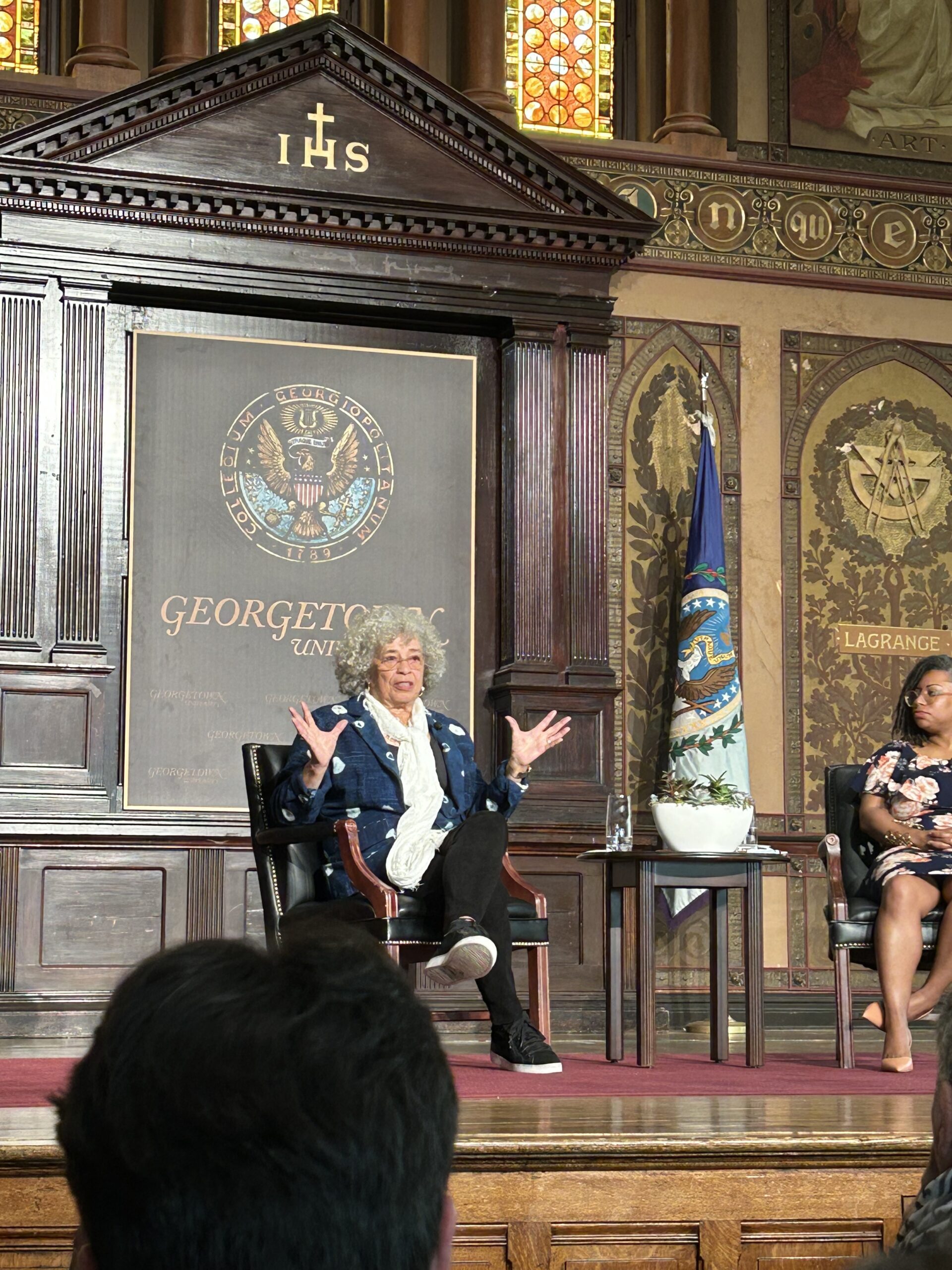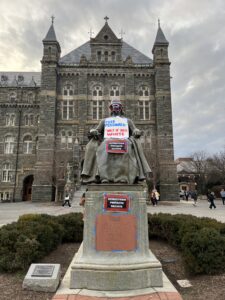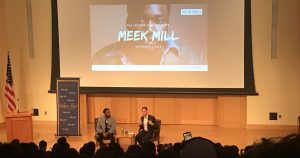Abolitionist and civil rights icon Dr. Angela Davis spoke of strength in collectivity to a packed Gaston Hall on the morning of April 27. In a conversation moderated by Professor Zandria Robinson of the African American Studies Department, Davis located herself within a tradition of Black feminism.
“I think I inherited a kind of radicalism,” she reflected. “My mother reminded us that things were not the way that they were supposed to be, and she called on us to imagine the way the world could be.”
Davis’ lecture, “Imagining Abolition,” foregrounded the possibility of change through collective action. In conversation with Robinson, she spoke about her childhood in the segregated South, and how the values she learned from her mother inspired her political activism. Davis was the featured speaker of the annual Jurist Lecture, organized by the Lecture Fund and supported by a collective of university partners, including the Georgetown Prisons and Justice Initiative and the American Studies Program.
Davis described her experience as a Black woman within a community of Black abolitionists. Her disagreement with George Jackson, a contemporary who gained renown for his autobiography-manifesto Soledad Brother, pushed her to examine the specific opposition that Black women faced.
“He had imbibed that heteropatriarchal ideology and the notion that Black women were somehow responsible for the oppression of Black men,” she explained. “That was what made me think more deeply about the role of Black women when I was in jail.”
Pausing for a moment, she added with a wink, “Oh yeah, I was in jail for a while. After I was on the F.B.I.’s Most Wanted list. It’s kinda weird that I’m in D.C. right now. Kinda scary.”
“I began to think specifically about Black women’s contributions because Black women specifically were under attack,” she said. “The Moynihan report charged Black women with being matriarchs and with failing to nurture a kind of masculinity within Black men, which they could only discover by going into the military.” The 1964 report commissioned by then-Labor Secretary Daniel Patrick Moynihan posited that Black men’s unemployment was due to the rise of Black households headed by single mothers, and that to remedy this social issue, Black America needed help from white America in adapting to heteropatriarchal norms.
Davis spoke of the necessity of Black joy in abolitionist work, adding humor in her reflections on her lifetime of activism. When asked about her book Blues Legacies and Black Feminism, which turns 25 this year, Davis referenced the power of music to articulate structures of feeling that words cannot. “Blues was a way to access the knowledge of working class Black women and how they might have thought about issues of gender, sexuality, labor, freedom,” she said.
Davis emphasized the importance of thinking beyond the bounds of nation and citizenship when asked by Dr. Robinson about the everyday processes of abolition. “Internationalism is at the heart of the struggle against capitalism,” she said. “It’s so interesting that we assume the nation is the primary mode of organizing human community, when it’s only the formation that has come into being historically.”
Davis invited the audience to challenge traditional understandings of temporality and history when thinking about revolution and protest.
“Usually when we think of the struggle against racism, we just go back to the 1960s,” she said. “But there were movements before that. The McCarthy Era happened before the 1960s, and prevented us from understanding the ways in which communists laid the groundwork for what we refer to as the Civil Rights Movement.”
Davis indicated institutional and cultural memory as central to ensuring the momentum of abolition. “You’re on a campus that has lots of movements. But how are you going to make sure that the people who come after you know about these movements?” she said. “We’re only here for a minute. But we need to make sure that what comes out of our work can be taken up by the next people.”
Her remarks resonated with a student body familiar with the tradition of organizing and collective action. Davis’ lecture marked nearly one year since the hate crime committed against LaHannah Giles (CAS ’23) on Georgetown Day 2022, which the university misclassified for months and subsequently lost all evidence of. Much of the student organizing led by Georgetown University Protects Racists (GUPR) in response to the university’s inaction drew on the memory of the Black Survivors Coalition in 2020 and the tactics used by that group.
Giles, a Black woman, told Davis about the incident and their response through activism with GUPR in a Q&A session following the lecture.
“My case has emphasized how despite changes regarding policies that emphasize diversity, equity, and inclusion, the university has served as an actor that nurtures racial injustice, maintains hierarchies between students, and protects white and wealthy students from accountability,” Giles said. They asked what practices helped Davis to balance her work as an activist with her personal well-being.
In her response, Davis underscored empathizing with other marginalized people through ways other than trauma bonding. “As important as it is when one is individually affected by racism to speak out and turn this into a collective phenomenon, it is equally if not more important to identify with those who are targets in different ways, and not to assume that one’s own personal experience is the only basis to do this,” Davis said.
Davis said that collective care, found in community with others, is a meaningful alternative to the self-care industry, whose primary incentive she identified as profit.
“There are other ways we can be together and experience joy,” she said. “That is a collective issue. I do think that art and music allow us both to imagine something different and to participate in an experience that cultivates the spirit and gives the mind a different way of reflecting on what it is we’re doing.”
Drawing on the principles of thick solidarity, Davis emphasized connection not through an erasure of differences, but through an understanding of common humanity. “When we come together, we should not be trying to transcend difference,” she said. “We always talk of unity as moving beyond difference; but what if difference is precisely the glue, precisely that which unifies us?”
Davis said that creating a community is the first step to making lasting change. According to her, strength in activism comes from strength in numbers; she advised the audience not to subscribe to the belief that significant impact could be made alone.
“We need to imagine ourselves not as individuals, but as part of a collective.”




